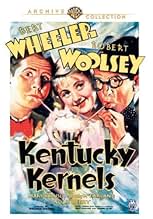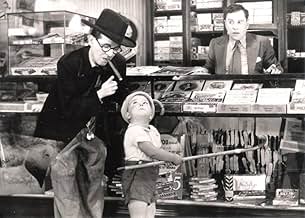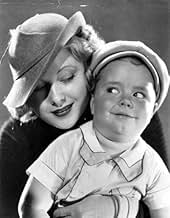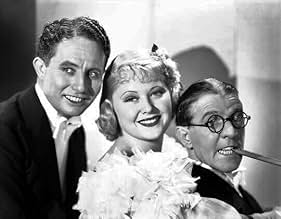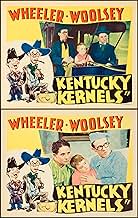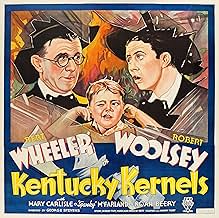AVALIAÇÃO DA IMDb
6,0/10
467
SUA AVALIAÇÃO
Adicionar um enredo no seu idiomaTwo out-of-work magicians help lovelorn Jerry adopt little Spanky. When Jerry makes up and elopes, the duo are stuck with the brat. Then Spanky inherits a fortune, so they all head to Kentuc... Ler tudoTwo out-of-work magicians help lovelorn Jerry adopt little Spanky. When Jerry makes up and elopes, the duo are stuck with the brat. Then Spanky inherits a fortune, so they all head to Kentucky and get caught between two feuding clans.Two out-of-work magicians help lovelorn Jerry adopt little Spanky. When Jerry makes up and elopes, the duo are stuck with the brat. Then Spanky inherits a fortune, so they all head to Kentucky and get caught between two feuding clans.
- Direção
- Roteiristas
- Artistas
George 'Spanky' McFarland
- Spanky Milford
- (as 'Spanky' McFarland)
Lucille La Verne
- Aunt Hannah Milfor
- (as Lucille LaVerne)
Willie Best
- Buckshot
- (as Sleep 'n' Eat)
Harry Bernard
- Destitute Man
- (não creditado)
Edgar Dearing
- Policeman
- (não creditado)
Jack A. Goodrich
- Double
- (não creditado)
William Gould
- One of the Milfords
- (não creditado)
Dorothy Granger
- Ethel - Baxter's Secretary
- (não creditado)
Avaliações em destaque
Willie Doyle (Bert Wheeler) and Elmer Dugan (Robert Woolsey) are out-of-work magicians. They are The Great Elmer and Company. They help Jerry Bronson adopt Spanky Milford, but Jerry elopes with his girlfriend leaving Spanky behind with the two magicians. Then they are told that Spanky has inherited a large estate. The trio head out to Banesville, Kentucky. At the train station, Willie and fellow passenger Gloria Wakefield (Mary Carlisle) fall for each other. Unbeknownst to the guys, the Milfords and Wakefields are embroiled in a generational blood feud.
Initially, I am amused by Wheeler and Woolsey and the kid. The kid is a bit too bratty and not quite cute enough. The glass breaking is a funny gag at first, but it gets more annoying over time. The guys never really get beyond mildly amusing. I don't hate these guys, but I'm not really laughing either.
Initially, I am amused by Wheeler and Woolsey and the kid. The kid is a bit too bratty and not quite cute enough. The glass breaking is a funny gag at first, but it gets more annoying over time. The guys never really get beyond mildly amusing. I don't hate these guys, but I'm not really laughing either.
Always enjoy Wheeler & Woolsey, even if their movie output is uneven; some are very funny, some are not so. I thought this one was pretty funny and that it succeeds due to the professional direction of George Stevens.
It is old-fashioned in that much of the humor consists of what must be old corny vaudeville jokes, sight gags and outrageous puns, all of which might not go over with today's audiences. Speaking for myself I can appreciate such antiquated antics, and I can also put into context outdated racial humor, such as found here in Willie Best's character. He plays his usual slow-talking, pop-eyed servant ("feets, do yo' duty!") by which he became famous.
Spanky McFarland was always a cute little kid and doesn't disappoint here. And this maybe the only time Noah Beery,Sr. sings on screen, and takes a turn along with everybody else singing a Kalmar-Ruby song "One Little Kiss", a very tuneful number written for this picture. Some reviewers take issue with the inane plot, about two feuding Kentucky families, but c'mon, folks. It's just a Wheeler & Woolsey comedy; were you expecting Ingmar Bergman?
It is old-fashioned in that much of the humor consists of what must be old corny vaudeville jokes, sight gags and outrageous puns, all of which might not go over with today's audiences. Speaking for myself I can appreciate such antiquated antics, and I can also put into context outdated racial humor, such as found here in Willie Best's character. He plays his usual slow-talking, pop-eyed servant ("feets, do yo' duty!") by which he became famous.
Spanky McFarland was always a cute little kid and doesn't disappoint here. And this maybe the only time Noah Beery,Sr. sings on screen, and takes a turn along with everybody else singing a Kalmar-Ruby song "One Little Kiss", a very tuneful number written for this picture. Some reviewers take issue with the inane plot, about two feuding Kentucky families, but c'mon, folks. It's just a Wheeler & Woolsey comedy; were you expecting Ingmar Bergman?
If you only know the little bruiser Spanky McFarland from his Litlte Rascals, this movie casts some light on why he was considered one of the best child actors of his generation. As an adorable little tyke with a penchant for breaking glass, he drives the movie's Kentucky feud storyline. He even signs a love song "One Little Kiss," to his best pal -- a cute dog, and one of the male leads sings a few lines to a donkey (It's that kind of movie).
Kentucky Kernels is notable for showing what was considered funny -- and in some cases, socially acceptable -- in 1934. An actor credited as "Sleep n Eat" (actually Willie Best) shuffles his way through the film as a stereotypical wide-eyed, scared-of-his-shadow servant. And a gay subtext between the two male leads is watered down by some forced and unconvincing romance with a typical blonde Southern belle, but lots of the movie's humor is derived from the male/male "romance." In their first scene, for example, Bert Wheeler and Robert Woolsey are the picture of domestic bliss -- bickering as one sits at the dinner table while the other does dishes and complains about his dishpan hands. Though they mince their ways through the rest of the movie, even holding hands at times, the characters are presented as heterosexual. At another point, they're shown sleeping in the same bed -- in a plantation mansion that surely had plenty of bedrooms.
The plot, with the boys finding themselves in the middle of a Hatfileds and McCoys-style Kentucy feud, is a bit contrived. Lines like "You dance exactly like a heifer -- I mean a zephyr!" seem lifted from the Marx Brothers, and in fact one of the supporting players is best known for her appearances as the straight woman in some Marx classics. Margaret Dumont plays the manager of an adoption agency that places young Spanky, indirectly, in the care of the vaudeville performers played by Wheeler and Woolsey. It's a shame Dumont wasn't given a more substantial part; she would have been terrific as a befuddled Southern matriarch later in the film.
The paper-thin plot won't really hold your attention, but viewed as a "film history" lesson, it's worth watching. Director George Stevens went on to much bigger and better things (including the enormous classic, Giant, also set in the South), so it's interesting to see how he handled this dull script.
Kentucky Kernels is notable for showing what was considered funny -- and in some cases, socially acceptable -- in 1934. An actor credited as "Sleep n Eat" (actually Willie Best) shuffles his way through the film as a stereotypical wide-eyed, scared-of-his-shadow servant. And a gay subtext between the two male leads is watered down by some forced and unconvincing romance with a typical blonde Southern belle, but lots of the movie's humor is derived from the male/male "romance." In their first scene, for example, Bert Wheeler and Robert Woolsey are the picture of domestic bliss -- bickering as one sits at the dinner table while the other does dishes and complains about his dishpan hands. Though they mince their ways through the rest of the movie, even holding hands at times, the characters are presented as heterosexual. At another point, they're shown sleeping in the same bed -- in a plantation mansion that surely had plenty of bedrooms.
The plot, with the boys finding themselves in the middle of a Hatfileds and McCoys-style Kentucy feud, is a bit contrived. Lines like "You dance exactly like a heifer -- I mean a zephyr!" seem lifted from the Marx Brothers, and in fact one of the supporting players is best known for her appearances as the straight woman in some Marx classics. Margaret Dumont plays the manager of an adoption agency that places young Spanky, indirectly, in the care of the vaudeville performers played by Wheeler and Woolsey. It's a shame Dumont wasn't given a more substantial part; she would have been terrific as a befuddled Southern matriarch later in the film.
The paper-thin plot won't really hold your attention, but viewed as a "film history" lesson, it's worth watching. Director George Stevens went on to much bigger and better things (including the enormous classic, Giant, also set in the South), so it's interesting to see how he handled this dull script.
Any enjoyment you get from KENTUCKY KERNELS will depend on whether or not you can view the film in the context of its time and accept all of the foolishness with that in mind. Otherwise, it's not a particularly rewarding way to view Wheeler and Woolsey. Surely, their reputation was based on better material than this.
The thin plot has the boys adopting SPANKY McFARLAND from an orphanage run by MARGARET DUMONT. He's a cute little bundle but has a penchant for breaking glass at every opportunity--and the script gives him plenty of excuses. Unfortunately, most of the gags are the kind of one-liners that must have killed vaudeville, delivered in brisk style but corny nevertheless.
LUCILLE LaVERNE shows up as an old dowager (she was the voice for The Wicked Queen in Disney's "Snow White"), and MARY CARLISLE is the love interest for one of the boys. The politically correct will be insulted by the WILLIE BEST racial humor in scenes where the boys go south.
Strictly a product of its time, ending in a skirmish between a Hatfield and McCoy type of family feud.
The thin plot has the boys adopting SPANKY McFARLAND from an orphanage run by MARGARET DUMONT. He's a cute little bundle but has a penchant for breaking glass at every opportunity--and the script gives him plenty of excuses. Unfortunately, most of the gags are the kind of one-liners that must have killed vaudeville, delivered in brisk style but corny nevertheless.
LUCILLE LaVERNE shows up as an old dowager (she was the voice for The Wicked Queen in Disney's "Snow White"), and MARY CARLISLE is the love interest for one of the boys. The politically correct will be insulted by the WILLIE BEST racial humor in scenes where the boys go south.
Strictly a product of its time, ending in a skirmish between a Hatfield and McCoy type of family feud.
Kentucky Kernels is another Wheeler/Woolsey comedy, where they decide to adopt Spanky (the same Spanky McFarland from the "Our Gang" show.) They go down south to visit the Colonel (Noah Beery) and Aunt Hannah ( Lucille LaVerne ) and meet up with the lovely Gloria Wakefield (Mary Carlisle) and the feuding Milfords. The plot is kind of all over the place, but we do get a good dose of Wheeler and Woolsey's standup comedy act along the way. Cast includes Willie Best ( Sleep N Eat ) as Buckshot; Director George Stevens sure did some of the great ones (A Place in the Sun, Diary of Anne Frank, Gunga Din). Some other interesting film connections - Viewers will spot Margaret Dumont (as Mrs. Baxter, head of the Children Welfare League), who made all those movies with the Marx Brothers. Writers Kalmar and Ruby had also written material for the Marx Brothers. Also, Mary Carlisle and Noah Beery's brother Wallace were both in Grand Hotel in 1932. Fun comedy, but pretty wacky and zany. Made at the beginning cusp of the production code in 1934, there are quite a few scenes and jokes that show two men are living together, sleeping in the same bed, keeping house, and adopting a child... pretty far ahead of its time!
Você sabia?
- Curiosidades"RKO" borrowed George 'Spanky' McFarland from "Hal Roach Studios" for this film.
- ConexõesFeatured in Hollywood the Golden Years: The RKO Story: Birth of a Titan (1987)
- Trilhas sonorasOne Little Kiss
(1934) (uncredited)
Written by Bert Kalmar, Harry Ruby
Performed by Bert Wheeler, Noah Beery, George 'Spanky' McFarland,
Robert Woolsey, Mary Carlisle and negro servants
Principais escolhas
Faça login para avaliar e ver a lista de recomendações personalizadas
Detalhes
- Data de lançamento
- País de origem
- Idioma
- Também conhecido como
- Kentucky Kernels
- Locações de filme
- Empresa de produção
- Consulte mais créditos da empresa na IMDbPro
- Tempo de duração1 hora 15 minutos
- Cor
- Proporção
- 1.37 : 1
Contribua para esta página
Sugerir uma alteração ou adicionar conteúdo ausente

Principal brecha
By what name was Em Palpos de Aranha (1934) officially released in India in English?
Responda
